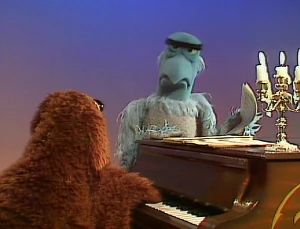BradFraggle (talk | contribs) No edit summary |
Gribbaziggy (talk | contribs) No edit summary |
||
| (14 intermediate revisions by 7 users not shown) | |||
| Line 1: | Line 1: | ||
| − | {{song|writer=[[Gilbert |
+ | {{song|writer=|composer=[[Gilbert and Sullivan|Arthur Sullivan]]|lyricist=[[Gilbert and Sullivan|W. S. Gilbert]]|date=1885|source=''The Mikado'' (light opera)|publisher= }} |
| + | [[Image:Titwillow.jpg|frame]] |
||
| − | The first and last verses of '''"Tit Willow"''', from [[Gilbert & Sullivan|Gilbert & Sullivan's]] ''The Mikado'', were performed by [[Rowlf the Dog]] and [[Sam the Eagle]] as the [[UK Spots (The Muppet Show)|UK Spot]] on [[Episode 120: Valerie Harper|episode 120]] of ''[[The Muppet Show]]''. |
||
| + | "'''Tit Willow'''," from [[Gilbert & Sullivan|Gilbert and Sullivan's]] light opera ''The Mikado'', tells the story of a sorrowful dicky-bird who sings "willow, tit willow, tit willow" until he plunges himself into the river flowing beneath his tree. The singer interprets the dicky-bird's action to be the result of unrequited love, and, by telling the story to his beloved, threatens to succumb to the same fate should she not return his affection. |
||
| + | [[Rowlf the Dog]] and [[Sam the Eagle]] performed the first and last verses of "Tit Willow" as the [[UK Spots (The Muppet Show)|UK Spot]] on [[Episode 120: Valerie Harper|episode 120]] of ''[[The Muppet Show]]''. The second verse, which explicitly details the dicky-bird's suicide, was cut. |
||
| ⚫ | |||
| ⚫ | Although the song is a solo in ''The Mikado'', Rowlf, at the piano, enlists Sam to play the part of the dicky-bird, assuring him that the song is from light opera and therefore respectable. Sam becomes increasingly awkward and impatient as he repeats "willow, tit willow, tit willow," and tries to ignore the laughter from the audience, which he does not understand. |
||
| ⚫ | |||
| + | |||
| ⚫ | |||
| + | An alternate title for the song is its first line, "On a tree by a river a little tom-tit." |
||
| − | [[Category: Muppet Show Songs]] |
||
| + | |||
| + | ==Audio releases== |
||
| + | *''[[The Muppet Show (album)|The Muppet Show]]'' (1977) |
||
| + | *''[[Muppet Hits Take 2]]'' |
||
| + | *''[[Favorite Songs From Jim Henson's Muppets]]'' |
||
| + | |||
| + | ==Video releases== |
||
| + | *''[[Rowlf's Rhapsodies with the Muppets]]'' (1985) |
||
| ⚫ | |||
| ⚫ | |||
Revision as of 13:43, 12 April 2010
| Music by | Arthur Sullivan |
| Lyrics by | W. S. Gilbert |
| Date | 1885 |
| Source | The Mikado (light opera) |

"Tit Willow," from Gilbert and Sullivan's light opera The Mikado, tells the story of a sorrowful dicky-bird who sings "willow, tit willow, tit willow" until he plunges himself into the river flowing beneath his tree. The singer interprets the dicky-bird's action to be the result of unrequited love, and, by telling the story to his beloved, threatens to succumb to the same fate should she not return his affection.
Rowlf the Dog and Sam the Eagle performed the first and last verses of "Tit Willow" as the UK Spot on episode 120 of The Muppet Show. The second verse, which explicitly details the dicky-bird's suicide, was cut.
Although the song is a solo in The Mikado, Rowlf, at the piano, enlists Sam to play the part of the dicky-bird, assuring him that the song is from light opera and therefore respectable. Sam becomes increasingly awkward and impatient as he repeats "willow, tit willow, tit willow," and tries to ignore the laughter from the audience, which he does not understand.
An alternate title for the song is its first line, "On a tree by a river a little tom-tit."
